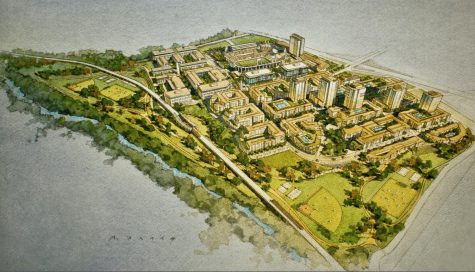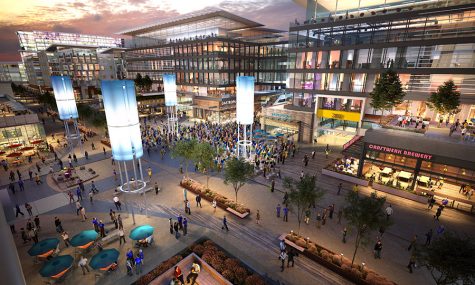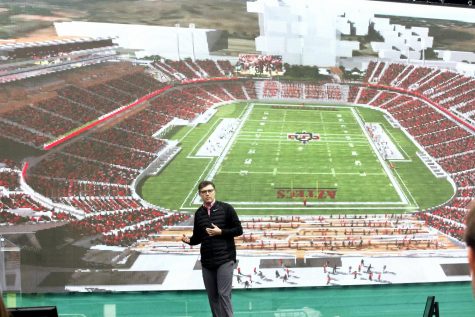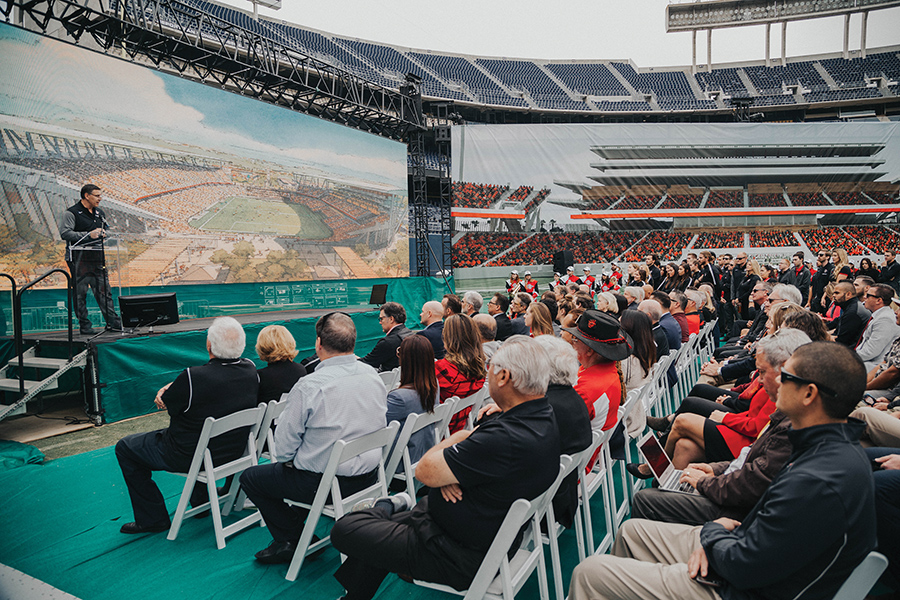SDSU, SoccerCity stadium initiatives poised for November showdown
With FS Investors' plan already on the ballot, university officials ready their own campaign.
December 6, 2017
Friends of SDSU, a new group formed to fight for the expansion of San Diego State onto the SDCCU Stadium site in Mission Valley, is collecting signatures for a ballot initiative that will compete with FS Investors’ SoccerCity plan on the November 2018 ballot.
The current working budget for a Mission Valley satellite campus is about $3 billion, while the cost for the new football stadium included in the proposal is about $250 million, SDSU President Sally Roush said Nov. 29.
Fred Pierce, an alumnus and spokesman for Friends of SDSU’s steering committee, is one of the more than 40 individuals who are pushing for the SDSU West initiative.
Among the steering committee’s members are former SDSU presidents Elliott Hirshman, Stephen Weber and Thomas Day, he said.
SDSU is not officially affiliated with the group or its drive to put SDSU West on the 2018 ballot, but most of the organization’s members are either alumni or have ties to the university.
“The steering committee are essentially the official sponsors of the SDSU West initiative,” Pierce said. “As the sponsors, we drafted, prepared and administered the process to launch the signature gathering to qualify the initiative for the ballot.”
Pierce said the committee, a non-profit organization, is well on its way to collecting 100,000 signatures for the initiative by the end of the year. The organization needs 71,000 signatures from registered voters to qualify.
“We’ve hired paid signature-gatherers who are trained in how to communicate about the initiative,” he said. “They are at selected locations throughout San Diego County, largely at shopping centers.”

Should the initiative make it onto the November 2018 ballot and win, SDSU would be able to purchase 132 acres of the SDCCU Stadium site to build a west campus. The initiative, according to Pierce, provides that the university would pay fair market value for the land which through an appraisal process and subsequent negotiations between the city and the university once the initiative is approved.
“Once a ballot initiative is published, the initiative cannot be changed,” Pierce said. “The reason why Friends of SDSU came together and have proposed this competitive initiative was because the university made it clear that the SoccerCity initiative did not work for them.”

SoccerCity’s proposed 33,000-seat stadium would be too small for SDSU to play football in, Pierce said.
If SDSU West defeats SoccerCity at the polls, a Major League Soccer team would be given an opportunity to become a tenant at the new stadium on the site, he said.
The SoccerCity plan is being headed up by FS Investors, a local investment group led by SDSU Directors Cabinet member Mike Stone.
SoccerCity spokesperson Nick Stone — no relation to the other Stone — said in an email that despite the competing plan, FS Investors would be willing to partner up with SDSU and would welcome the university as tenants or partners.
“Unfortunately, SDSU is unable to extend that hospitality in the other direction, because of the constraints of the MLS bid process,” Stone said. “The SDSU West proposal can’t satisfy MLS needs or timeline. If the SoccerCity initiative doesn’t win, San Diego’s bid for MLS is dead, and the last of the four remaining MLS franchises will be awarded to other cities. Of course, we’re going to work hard to win voter approval for SoccerCity so we can have both”

SoccerCity is already qualified for the November 2018 ballot.
The proposal’s backers have and gathered more than 110,000 signatures in a record two-week time frame last spring, Stone said.
“Clearly, San Diegans are ready to welcome MLS, to see the long-held vision for open space on the San Diego river realized, to have see the kind of growth that complies with the Climate Action Plan — all without any taxpayer subsidy,” Stone said.
There are plenty of residents within San Diego County who do not support SoccerCity.
Joe LaCava, a spokesman for Public Land, Public Vote, said SoccerCity is a “massive land grab.” “The talking points and the pretty pictures offered by the proponents does not reflect the actual language of the initiative,” he said.
LaCava said that his coalition is 100 percent opposed to the SoccerCity initiative, but has not taken a position on the Friends of SDSU initiative.
“With the SDSU initiative, it actually embraces a public input process as to what land uses should be considered there and just as importantly proposes a full public process for an environmental impact report and full disclosure of what the impacts are in development of the appropriate mitigation,” he said. “The SoccerCity initiative, in stark contrast, completely avoided public input in developing their proposal and did a very limited environmental analysis and only identified those mitigation measure that they thought were appropriate.”
A previous article misattributed Nick Stone’s comments to Andy Altman, another SoccerCity associate. The error has since been corrected.

